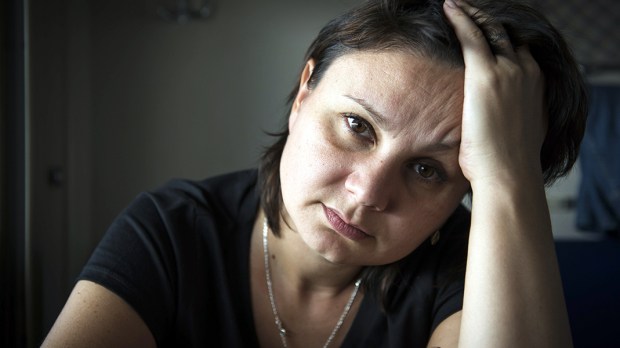Despite having a great midwife, and tremendous support from her husband, Ellen Smith’s* planned home birth wasn’t the intense-but-peaceful experience they were hoping for. And when it was all over, it wasn’t quite over yet. I asked Ellen to share her experience, and she explained,
“The two worst moments of the labor, which were easily the two most horrifying and painful moments of my life, both happened in the tub. Not our normal tub, but the one we had set up downstairs.
“After the birth, I guess later that same day or maybe a couple days after, [my husband] helped me upstairs to take a bath in our regular tub. When I climbed into the water, my whole body started shaking and I burst into tears, and the water felt like it was burning my skin.”
This is just one of the many ways that postpartum post-traumatic stress disorder (P-PTSD) might manifest itself. It’s more common than you know, affecting up to 16% of postpartum mothers. You probably know somebody who’s experienced these symptoms, although she might not have had the words to describe it.
A person experiencing postpartum PTSD might have flashbacks, nightmares, anxiety, anxiety, irritability, depression, or just an overall sense of numbness. She might find herself avoiding the baby, in an effort to avoid anything that triggers flashbacks or anxiety. Doctors who screen for postpartum depression (PPD) might mistake P-PTSD symptoms for PPD, since it’s not commonplace to screen for yet.
What causes postpartum PTSD
We hear about PTSD and we immediately think of veterans, or victims of shootings, assaults, and muggings. It’s not the kind of thing we associate with childbirth, especially if nothing dangerous or even unusual has happened. But the way the brain processes trauma is different for everybody, and that means that a person can experience trauma during what appeared to everyone else to be a totally “uncomplicated” childbirth.
It doesn’t just happen to women who get emergency c-sections, or start hemorrhaging, or have the baby in the car on the way to the hospital, although those can all be causes too. It might happen because you felt powerless, or had no emotional support, because you’ve been through trauma in the past, or because you had a particularly hard pregnancy
Experiencing postpartum PTSD just means that your brain needed more time than it got to process what it went through, and it’s still struggling to work through the trauma in a way that brings peace.
What’s going on in the brain
Stress hormones from trauma make the hippocampus, the part of the brain responsible for memory, less effective. That’s why a PTSD flashback feels like you’re going through the event all over again, not like you’re remembering some past event. At the same time, the amygdala, which is in charge of the fight/flight response so necessary for our survival, and which “tags our memories with emotion,” becomes overstimulated. It begins perceiving threat where it didn’t before.
When Ellen’s skin touched the water, her brain responded as though she were going through the traumatic experience of childbirth all over again, and reacted accordingly. It was trying to protect her. It didn’t know she was safe.
How to move forward
Whatever kind of birth experience you had, you didn’t develop postpartum PTSD symptoms because you are weak, or because you did anything wrong. And you’re not alone. Many types of therapy, including cognitive behavioral therapy (CBT) and EMDR, have been found to be effective. Websites such as Solace for Mothers and Postpartum Progress offer education, resources, and support. Healing is absolutely possible, and it starts with the knowledge that what you’re going through is real, and treatable.
* Name has been changed to protect privacy

Read more:
How to let go of fear about your pregnancy

Read more:
The little decision that prepared me the most for my postpartum weeks

